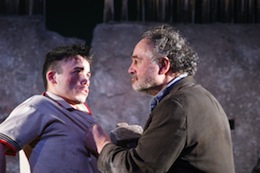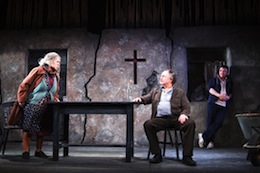Martin McDonagh’s A Skull in Connemara is the forgotten sister in The Leenane Trilogy. Premiered by Druid in 1997, A Skull chronicles the dismal trade of Mick Dowd, a gravedigger charged each autumn with disinterring bones from his local cemetery to make space for new tenants. When Mick has to dig up the grave of his dead wife, Oona, it unearths muffled rumours about Mick’s role in her sudden death.
While the play’s older and younger siblings, The Beauty Queen of Leenane and The Lonesome West, respectively, bloom in the sun of directors’ attentions, the rarely-staged A Skull in Connemara seems to cower sullenly in the corner. Can Andrew Flynn’s new production for Decadent Theatre coax A Skull into the light?
At the heart of Flynn’s campaign is John Olohan’s nuanced portrayal of Mick Dowd as sympathetic and sinister. From a plodding, weary walk to a deliriously exuberant celebration and from vehement denials of murder to the haunting blankness of a (possible) cold-blooded killer, Olohan’s complex characterisation navigates Mick’s emotional breadth with grace and fluency. The precision of the performance suggests both wounded victim of local gossip and remorseless murderer, devoted husband and cunning psychopath. Not only are the seeds of doubt planted in the audience’s mind, but Olohan subtly imbues Mick with a touching uncertainty about his own actions.
 To Mick’s chagrin, the local priest assigns the naïve, inept but affable Martín Hanlon (Jarlath Tivnan) as helper for the “graveyard shenanigans”. Despite their initial antagonism (verbal sparring bleeds into vigorous jostling), there’s a strong sense of the bond forged between Mick and Martín as the latter evolves from lippy apprentice into valued confidant. Tivnan’s highly physical performance emphasises Martín’s flighty nature, with his movements becoming increasingly unmoored as the character gets progressively drunk on Mick’s poteen. But Tivnan frequently declaims his lines, exaggerating the delivery of some of the funniest exchanges in the play, in a tic that is thrown into sharp relief by Olohan’s restrained style.
To Mick’s chagrin, the local priest assigns the naïve, inept but affable Martín Hanlon (Jarlath Tivnan) as helper for the “graveyard shenanigans”. Despite their initial antagonism (verbal sparring bleeds into vigorous jostling), there’s a strong sense of the bond forged between Mick and Martín as the latter evolves from lippy apprentice into valued confidant. Tivnan’s highly physical performance emphasises Martín’s flighty nature, with his movements becoming increasingly unmoored as the character gets progressively drunk on Mick’s poteen. But Tivnan frequently declaims his lines, exaggerating the delivery of some of the funniest exchanges in the play, in a tic that is thrown into sharp relief by Olohan’s restrained style.
If Flynn is partly remiss here, he deftly succeeds in switching the mood of the play during the irreverent scene when Mick and Martín zealously smash disinterred skulls. Fused with palpable debauchery, Flynn laces the scene with a daring motif whose significance is only revealed in the production’s closing moment.
A Skull interweaves the essentials of McDonagh’s early stagecraft: an amoral west of Ireland locale, cartoon violence (Martín complains of a “biteen headache” despite an enormous bloody crack through the centre of his head), wordplay (“a bloody better batter it will be”), garbled syntax (“I’m saying nothing. Nothing at all am I saying”) and twisted logic (“She’d’ve been the first to defend me if she heard the town was saying I murdered her on purpose”). Perched on top of this stew, of course, are McDonagh’s lonely, resentful and frustrated characters (“monstrous children” as Garry Hynes insisted), here in suitably dishevelled costumes by Petra Bhreatnach, the jarring montage of Maryjohnny’s reds, greens and browns, in particular, helping to sketch her dissonance.
Bríd Ní Neachtain offers an extremely accomplished portrayal of Maryjohnny as a conniving, bitter grandmother. The actor’s stern, rigid sitting position alone conveys Maryjohnny’s psychology, while Ní Neachtain coats her vindictive pronouncements (including the grudge she holds against children who called her fat 27 years ago) with an unadulterated vitriol. Similarly, Patrick Ryan essays a carefully understated and compassionate performance as Garda Thomas Hanlon in a role that could easily be caricatured. Exasperated at his superior’s failure to acknowledge his policing finesse, Thomas is more Inspector Clouseau than Colombo. A hallmark of McDonagh’s characters is the way they reiterate their caustic insults when forced into hollow apologies and Ryan distills this technique by delivering his ‘apology’ to Mick (“I take wife-butcherer back, so”) through gritted teeth.
 Most of the action takes place in the main room of Mick’s cottage and Owen MacCarthaigh’s set design is dominated by a fittingly monochromatic greyness. A cross is sculpted into the back wall, which is punctuated by two windows on either side of the back door and serrated by three large cracks. High above the thatch, and seemingly on a hill behind the cottage, is a lantern and Celtic cross.
Most of the action takes place in the main room of Mick’s cottage and Owen MacCarthaigh’s set design is dominated by a fittingly monochromatic greyness. A cross is sculpted into the back wall, which is punctuated by two windows on either side of the back door and serrated by three large cracks. High above the thatch, and seemingly on a hill behind the cottage, is a lantern and Celtic cross.
Nothing encapsulates Decadent’s imaginative production more than the transition from the cottage in Scene 1 to the graveyard in Scene 2: the back wall of the house collapses forward to reveal the side-profile of a murky cemetery.
Rising at a 45 degree angle from stage right, the set’s sophisticated authenticity is heightened by strikingly realistic gravestones, including the Celtic cross visible during the opening scene. As Scene 2 opens, Mick stands in a fully excavated grave. Later, he disappears from view as he digs all the way through his wife’s grave to her coffin. The scene edges towards its climax as Mick reaches and then prepares to open his wife’s coffin. While this unfolds, Sinéad McKenna uses the lantern (also seen in the opening scene) to cast long shadows across the graveyard, gradually dimming the lighting, and Carl Kennedy’s howling sound effects enhance the Gothic atmosphere.
It’s a courageous, brilliantly executed transition as MacCarthaigh’s inspired graveyard set lends the production a new momentum; it’s as if the sprockets are just connecting with the chain. While the design distances the actors from the audience, it’s a gamble that pays rich dividends. When the scene ends, Mick, Martín and Thomas exit at stage right. As they make their way across the set, their silhouettes are hauntingly framed against a Royal blue backdrop.
Andrew Flynn, nominated as Best Director for Decadent’s production of Port Authority in the 2012 Irish Times Theatre Awards, forensically mines A Skull’s broad comedy by celebrating McDonagh’s rhythmic language and zooming in on tiny details (Mick stores the disinterred bones in two fertilizer bags).
In a way, Decadent is bringing A Skull in Connemara back home: this is the first production of the play at the Town Hall Theatre since its premiere, when Druid presented The Leenane Trilogy by a fledgling playwright. Although A Skull is one of the flimsier plays in McDonagh’s canon, Flynn’s assured, stylish production is less a revival than an illuminated restoration.
Brendan Daly is a freelance arts journalist and critic for publications in Ireland and the U.S.